Hyundai i30 VS Toyota Corolla
In this head-to-head comparison, the Hyundai i30 impresses with its sporty design and engaging driving dynamics, making it a favorite among enthusiasts. On the other hand, the Toyota Corolla shines with its reputation for reliability and fuel efficiency, appealing to practical buyers. Ultimately, both models offer compelling features, catering to different preferences in the competitive hatchback segment.
Hyundai i30
The Hyundai i30 stands out in the hatchback segment with its sleek design and modern features. It offers a comfortable ride with a well-crafted interior that caters to both driver and passengers. With its emphasis on safety and technology, the i30 provides a balanced driving experience suitable for urban and suburban environments.
detailsToyota Corolla
The Toyota Corolla Hatchback stands out with its sleek design and modern aesthetic, making it a desirable option for those seeking both style and practicality. Inside, the cabin offers a comfortable and contemporary environment with high-quality materials and advanced technology features that enhance the driving experience. On the road, the Corolla Hatchback delivers a smooth and responsive drive, backed by a reliable performance that has become synonymous with the Toyota brand.
detailsHyundai i30 vs. Toyota Corolla: A Comprehensive Comparison
In the competitive compact hatchback segment, the Hyundai i30 and Toyota Corolla have emerged as frontrunners, each offering distinctive features, performance, and technology. Car enthusiasts and everyday drivers alike are keen to know how these models stack up against each other. In this article, we delve into the technical specifications, innovations, and overall driving experience of the latest Hyundai i30 and Toyota Corolla.
Powertrains and Performance
The Hyundai i30 boasts a diverse range of engine options, with choices between petrol and petrol MHEV (Mild Hybrid) variants. It offers two main power outputs: 100 HP and a more powerful 140 HP variant, available with either a manual gearbox or a dual-clutch automatic transmission. The i30 records an impressive acceleration from 0 to 100 km/h in as little as 9.6 seconds and reaches a top speed of 197 km/h. Its fuel consumption ranges from 5.6 to 5.9 L/100 km, depending on the engine variant, making it a fuel-efficient choice for daily commuting.
On the other hand, the Toyota Corolla is powered exclusively by hybrid technology, offering two power outputs of 140 HP and 196 HP for 2024. Built for efficiency, the Corolla excels with exceptional fuel consumption figures as low as 4.4 L/100 km. The Corolla also features a continuously variable transmission (CVT), which contributes to a smooth driving experience. It accelerates from 0 to 100 km/h in an impressive 7.5 seconds and has a top speed of 180 km/h.
Dimensions and Practicality
When it comes to dimensions, the Hyundai i30 measures 4340 mm in length, 1795 mm in width, and stands 1455 mm high, making it a compact yet spacious hatchback. It offers a trunk capacity of 395 liters, providing ample storage for luggage and groceries, with a maximum payload of 509 kg.
The Toyota Corolla slightly edges out in length at 4370 mm, while maintaining a width of 1790 mm and height of 1435 mm. The hatchback variant features a smaller trunk capacity compared to the i30, offering 361 liters, but still manages a respectable maximum payload of 450 kg, providing versatility for everyday use.
Technology and Innovations
The 2024 Hyundai i30 incorporates a host of innovative technologies, including advanced driver assistance systems, a state-of-the-art infotainment system with a touchscreen interface, smartphone connectivity, and enhanced safety features. The i30 is designed with the modern driver in mind, providing convenience and connectivity that aligns with current digital lifestyles.
Meanwhile, the Toyota Corolla benefits from Toyota’s extensive experience in hybrid technology, featuring an intelligently designed hybrid powertrain that emphasizes efficiency without sacrificing performance. The car comes equipped with a suite of safety technologies, such as an adaptive cruise control system, lane departure warning, and automatic emergency braking, ensuring a comprehensive safety net for its occupants.
Environmental Impact
In terms of environmental performance, the Hyundai i30 falls within the CO2 Efficiency Class D, emitting between 126 to 133 g/km depending on the engine configuration. While reasonable, the emphasis on hybrid technology in the Toyota Corolla enhances its eco-friendliness, placing it in CO2 Efficiency Class C, with emissions as low as 100 g/km.
Conclusion: Choosing Between Two Giants
Both the Hyundai i30 and Toyota Corolla exhibit impressive attributes, catering to a wide range of preferences in the compact hatchback market. The i30 shines with its vibrant performance and spacious configuration, making it an excellent family car. Meanwhile, the Corolla stands out as a leader in hybrid efficiency, appealing to environmentally conscious drivers.
Ultimately, the choice may come down to personal preferences such as driving style, brand loyalty, and desired features. Whichever model you choose, both the Hyundai i30 and Toyota Corolla undoubtedly offer a compelling driving experience backed by modern technology and dependable performance.
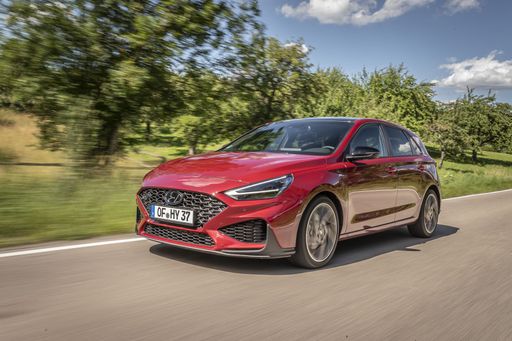 @ hyundai.news
@ hyundai.news
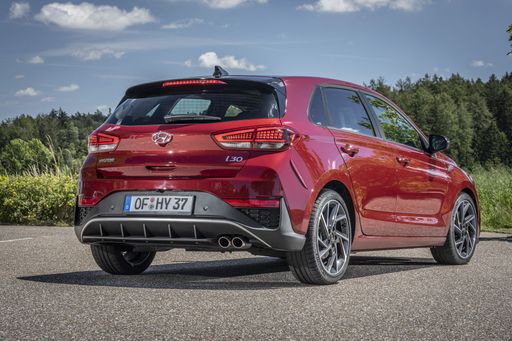 @ hyundai.news
@ hyundai.news
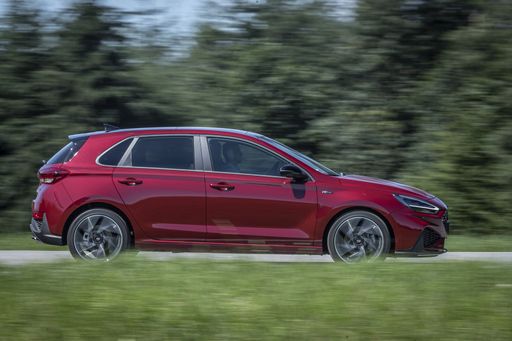 @ hyundai.news
@ hyundai.news
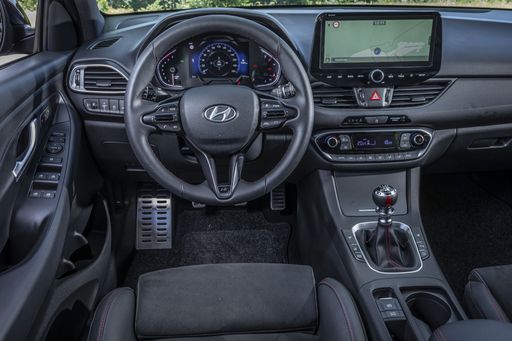 @ hyundai.news
@ hyundai.news
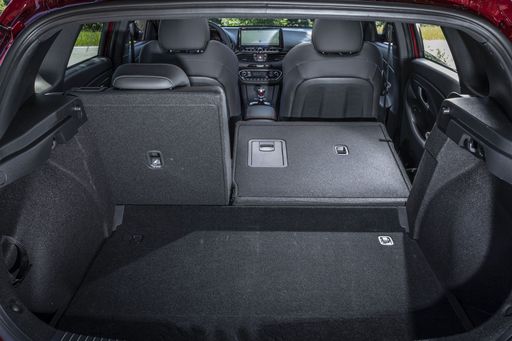 @ hyundai.news
@ hyundai.news
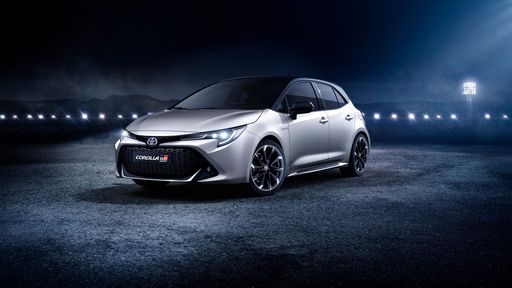 @ Toyota
@ Toyota
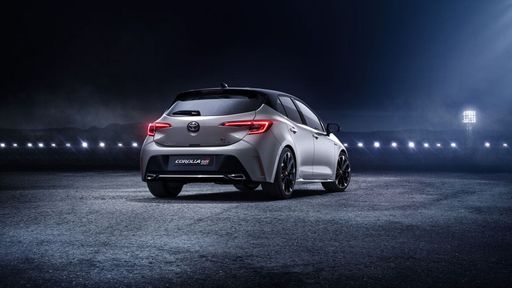 @ Toyota
@ Toyota
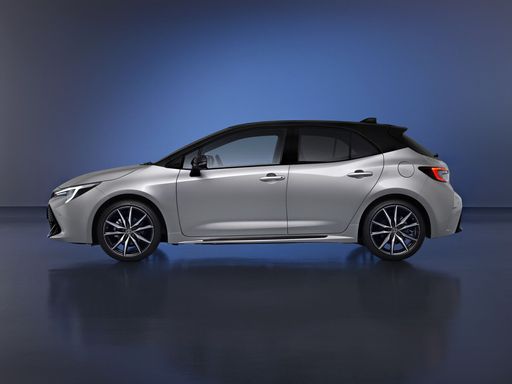 @ Toyota
@ Toyota
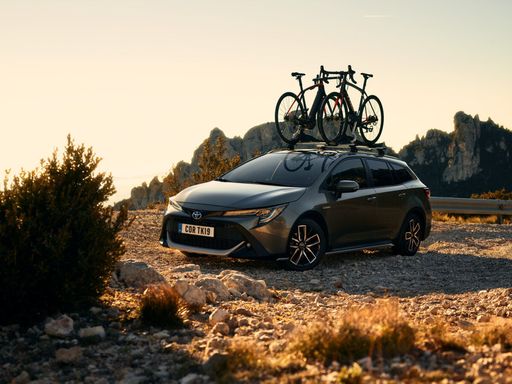 @ Toyota
@ Toyota
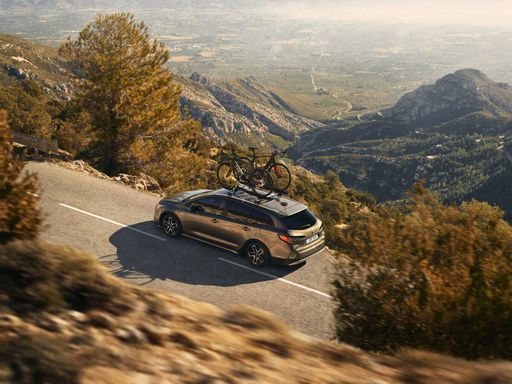 @ Toyota
@ Toyota

|

|
|
|
|
Costs and Consumption |
|
|---|---|
|
Price
about 25500 - 31100
$
|
Price
about 30800 - 37700
$
|
|
Consumption L/100km
5.6 - 5.9
L
|
Consumption L/100km
4.4 - 4.6
L
|
|
Consumption kWh/100km
-
|
Consumption kWh/100km
-
|
|
Electric Range
-
|
Electric Range
-
|
|
Battery Capacity
-
|
Battery Capacity
-
|
|
co2
126 - 133
g/km
|
co2
100
g/km
|
|
Fuel tank capacity
50
L
|
Fuel tank capacity
43
L
|
Dimensions and Body |
|
|
Body Type
Hatchback
|
Body Type
Hatchback
|
|
Seats
5
|
Seats
5
|
|
Doors
5
|
Doors
5
|
|
Curb weight
1291 - 1407
kg
|
Curb weight
1420 - 1460
kg
|
|
Trunk capacity
395
L
|
Trunk capacity
313 - 361
L
|
|
Length
4340
mm
|
Length
4370
mm
|
|
Width
1795
mm
|
Width
1790
mm
|
|
Height
1455
mm
|
Height
1435
mm
|
|
Payload
463 - 509
kg
|
Payload
400 - 450
kg
|
Engine and Performance |
|
|
Engine Type
Petrol, Petrol MHEV
|
Engine Type
Full Hybrid
|
|
Transmission
Manuel, Automatic
|
Transmission
Automatic
|
|
Transmission Detail
Manual Gearbox, Automat. Schaltgetriebe (Doppelkupplung)
|
Transmission Detail
CVT
|
|
Drive Type
Front-Wheel Drive
|
Drive Type
Front-Wheel Drive
|
|
Power HP
100 - 140
HP
|
Power HP
140 - 196
HP
|
|
Acceleration 0-100km/h
9.6 - 13.1
s
|
Acceleration 0-100km/h
7.5 - 9.2
s
|
|
Max Speed
178 - 197
km/h
|
Max Speed
180
km/h
|
|
Torque
172 - 253
Nm
|
Torque
-
|
|
Number of Cylinders
3 - 4
|
Number of Cylinders
4
|
|
Power kW
74 - 103
kW
|
Power kW
103 - 144
kW
|
|
Engine capacity
998 - 1482
cm3
|
Engine capacity
1798 - 1987
cm3
|
|
Top speed
178 - 197
km/h
|
Top speed
180
km/h
|
General |
|
|
Model Year
2024
|
Model Year
2023 - 2024
|
|
CO2 Efficiency Class
D
|
CO2 Efficiency Class
C
|
|
Brand
Hyundai
|
Brand
Toyota
|
Hyundai i30
Introducing the Hyundai i30: A Blend of Performance and Innovation
The Hyundai i30 continues to impress the automotive world with its fine balance of performance, efficiency, and cutting-edge technology. As a quintessential hatchback, the i30 caters to a diverse range of drivers, offering a remarkable driving experience through its impressive powertrains and compact yet stylish design.
Dynamic Performance Options
At the heart of the Hyundai i30 lies a variety of engine choices designed to suit different driving preferences. The power output ranges from 100 PS to 280 PS, allowing drivers to choose an i30 that perfectly matches their performance needs. Whether you're inclined towards the spirited drive of the N Performance variants or prefer the efficiency of the mild hybrid versions, there’s a powertrain tailored for you.
Innovative Hybrid Technology
For those seeking enhanced fuel efficiency without compromising on power, the i30’s 48V mild-hybrid system offers a compelling option. Available with both manual and automatic transmissions, this innovative technology provides an ideal balance, reducing emissions and improving fuel consumption, with an impressive average of just 5.7 L/100km.
Sophisticated Design and Features
The Hyundai i30’s sleek design is complemented by thoughtful interior features that elevate the driving experience. With a boot space ranging from 395 to 450 litres, this hatchback ensures ample room for all your luggage needs. Furthermore, the car's aesthetic appeal is matched by its practical ergonomic layout, catering to both style enthusiasts and those seeking functionality.
Advanced Safety and Technology
The i30 is equipped with an array of advanced safety features, enhancing driver confidence and ensuring passenger safety. Its cutting-edge safety suite includes lane-keeping assist, forward collision warning, and adaptive cruise control. Additionally, the i30 offers a modern infotainment system, designed to keep you connected and entertained on every journey.
Conclusion: A Versatile Choice for Modern Drivers
The Hyundai i30 is more than just a hatchback; it’s a remarkable amalgamation of power, efficiency, and modern technology. Whether you're enticed by the high-performance models or the eco-friendly mild-hybrid variants, the i30 stands out as a versatile choice that meets the demands of today’s discerning drivers.
Toyota Corolla
The Toyota Corolla Hatchback: A Modern Icon
The Toyota Corolla has long been a hallmark of reliability and performance in the automotive world, and the hatchback variant continues to uphold this tradition with impressive technical specifications and innovative features. It seamlessly marries practicality with advanced technology, making it a compelling choice for a wide range of drivers.
Striking Design and Dimensions
The sleek design of the Toyota Corolla Hatchback offers more than just aesthetic appeal. With dimensions measuring 4,370 mm in length, 1,790 mm in width, and 1,435 mm in height, the Corolla Hatchback offers a compact footprint suitable for urban environments while maintaining ample interior space. The model comes with five doors, providing convenient access for all passengers, and a boot space of 313 to 361 litres, suitable for everyday storage needs.
Powertrain and Performance
The Corolla Hatchback features an advanced full-hybrid powertrain, available in both 1.8-litre and 2.0-litre engine variants, offering power outputs ranging from 140 to 196 PS (103 to 144 kW). This is paired with a smooth CVT automatic transmission, delivering power efficiently to the front wheels. The hatchback achieves a commendable fuel economy of 4.4 to 4.6 L/100 km and CO2 emissions marked at 100 g/km, showcasing Toyota’s commitment to sustainable driving solutions.
Hybrid Efficiency at its Best
With its hybrid technology, the Corolla Hatchback ensures an outstanding blend of performance and efficiency. The model is capable of accelerating from 0 to 100 km/h in 7.5 to 9.2 seconds, allowing drivers to enjoy spirited driving when desired with a maximum speed of 180 km/h. The seamless integration of the hybrid system optimises both city and highway driving conditions, providing responsive handling without sacrificing fuel economy.
Comfort and Innovation Inside
Inside the Corolla Hatchback, passengers are treated to a well-appointed cabin packed with modern conveniences. Depending on the trim level, from the practical "Business Edition" to the sporty "GR SPORT", the car offers a variety of features aimed at enhancing driver and passenger experience. It comfortably seats five adults and incorporates advanced infotainment options alongside a host of safety technologies, reiterating Toyota's focus on innovation and driver satisfaction.
Affordability and Running Costs
The Toyota Corolla Hatchback offers a competitive price range from €33,340 to €40,740. In addition, running costs remain manageable with estimated monthly expenses between €900 and €998, and a per kilometre cost of 36 to 39.9 cents. With affordability accompanied by high residual value, the Corolla Hatchback represents an economical choice for buyers.
Conclusion: A Solid Choice for the Modern Driver
The Toyota Corolla Hatchback stands as a testament to the blend of tradition and innovation. Its efficient performance, compact design, and state-of-the-art technology make it ideal for modern lifestyles. Whether navigating city streets or enjoying long drives, the Corolla Hatchback promises a reliable and enjoyable driving experience.
